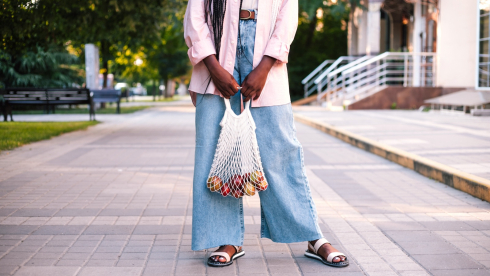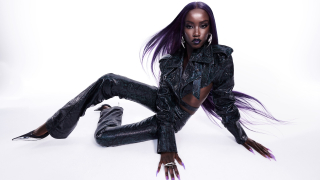While the Internet would have us believe that rapper Bahamadia released her underrated 1996 debut album Kollage (Chrysalis/EMI Records) on March 23, the Philly-based beat-box poet insists that the disc actually dropped on April 2. No matter when it came out, 20 years later, the gritty poet’s first long-playing joint remains one of the best rap albums of that era. Coming in the pivotal year of ’96 during the boom-bap and bling bling era of Bad Boy, Death Row and Wu-Tang (as well as Foxy Brown and Lil Kim), hip-hop culture was once again changing.
While some rappers’ sole purpose of engaging in hip-hop was simply to outdo their profiteering peers as they rhymed about designers and diamonds, others were more concerned with preserving the genuineness of pure rap skills that give the art form heft and resonance. Kollage still serves as solid evidence that not everyone was swayed by the glitter of platinum dreams and streetwise drug schemes.
Kollage’s fierce combination of stiletto-sharp samples and grimy grammar that carried over from the wonderful first track “Wordplay” to the dreamy “Biggest Part of Me,” its closing song, a testimony to the love she has for her children. Bahamadia’s words, like my other favorite MCs who all recorded with with Rza, resonated with weed heads, boho b-boys & girls, and old school folks who respected a young sista who knew how to spit textual jewels.
Bahamadia, whose book knowledge meets streetwise style won scores of fans that follow her on Facebook and Twitter, came up at a time when “social media” meant leaving your house and actually doing something. Having started out as teenage DJ who spun boogie down singles at neighborhood jams with her West Philly Sound Crew, she also wrote also poetry in her journals. “My mom was my first creative teacher,” Bahamadia says. “She always encouraged me and my sister to express ourselves. There are also a lot of visual artists in the family.”
By the time Bahamadia was discovered by rapper Guru from Gang Starr in 1993, she was a fully formed artist who could bring it to both the stage and the studio. After displaying her skills on the track “Respect the Architect” from Guru’s own Jazzmatazz Vol. II and the Big Kap posse cut “Da Ladies in the House” alongside Jersey-girl rapper Lauryn Hill, Bahamadia began planning concepts for her own album.
Big Kap ft. Bahamadia, Lauryn Hill, Precise, Uneek – Da Ladies In The House
“The title Kollage was a reflection of my state of mind,” she recalls. “I first got interested in music from playing my parents’ and grandparents’ records, as well what I heard on the radio. I wanted Kollage to reflect that diversity both lyrically and sonically.”
With a verbal style that was laid back while still bursting with energy, Bahamadia’s flow was as inspired by the soul women Aretha Franklin and Nancy Wilson, as well as Tribe Called Quest, Schoolly D, Lady B and Will Smith. “I remember hearing Lady B.’s “To the Beat Ya’ll and loving it; Sha Rock was another MC I liked. One of the early lessons I got from observing (fellow Philly artists) was, just be yourself.” Bahamadia’s first recording was “Funky Vibe,” made for the local Philly label Riqs Records (“Philly is definitely blunted for the 9D’s”) in 1993.
Funky Vibe
Before signing with Chrysalis/EMI Records, Bahamadia was also being courted by West Coast beat master Dr. Dre, who’d heard her skills via Dogg Pound member Kurupt (a Philly native) and Bad Boy Records, but Bahamadia teamed up with Guru for obviously aural reasons relating to the vintage futuristic pound of the gritty New York sound. Guru first heard Bahamadia’s pure poetics while he was partying in her native Philly, when it was time to record the album, she relocated to New York City and worked with a variety of like-minded producers at the legendary D&D Studios during its prime years when rebel rousing MCs were rhyming in every room.
Bahamadia – Uknowhowwedu
“When I was recording Kollage, there were some legendary sessions going on right next door. I might see Biggie and Camp-Lo one day, LL Cool J the next and Big L the day after that. They all made me feel as though I belonged. Premier, especially, gave me some great advice.” Although the “dingy and dirty” studio was often a b-boys club that included some of the illest working in various rooms, Bahamada was never made to feel like an interloper. “At D&D, everything was so natural and cool, I just felt like I belonged.”
As the sound factory for the Gang Starr Foundation, which included Jeru the Damaja and the Group Home, it was there that Guru, his supreme producer DJ Premier and a host of others created the posse’s instant rap classics. Bahamadia’s sessions, as the Kollage proves, were also a part of that historical canon of classic recordings crafted inside the now-shuttered Times Square studio. In the end, the entire project was recorded at D&D. Working with both Guru and DJ Premier, the rapper also recruited hometown buddies The Roots (“Da Jawn”), former Geto Boys producer N.O. Joe (“I Confess”) and the Da Beatminerz (“Innovation”), who provide the brilliant soulful/jazzy soundscapes for her “new versions of flows.”
Bahamadia – 3 The Hard Way
In addition, she also worked with producer and EPMD member Erick Sermon on a remix for “I Confess;” originally she’d tried to get Nas involved as well in doing a remix, but it never happened. Chrysalis/EMI supported Bahamadia’s vision through five singles and a music video, including the powerful street-beat debut “Total Wreck,” a track that first appeared on the Guru’s collective Ill Kid sampler in 1994; the more chill “uknowhowwedu,” a tribute to her Philly peeps, and the swag strut club banger “True Honey Buns” was further prove that B. was no joke. Thinking back to the afternoon “Total Wreck” was made, she says, “I didn’t even know that we were going to have a session that day. I wrote that on the fly and recorded in a four-track studio; it was a controlled freestyle. I never made had a demo or anything. I just went in the studio and started working on songs.”
While the video for “Total Wreck” features a cool DJ spinning discs, Bahamadia never an official turntable wiz to call her own. “I’ve worked with some of the best DJs in history,” she says, “especially in Philly; the only great DJ in Philly I’ve never worked with is Jazzy Jeff. I think Philly hip-hop is quite underrated, but people need to realize we too are forward thinkers. We bring skills to the table. For us it’s more than work, it’s a lifestyle.”
True Honey Buns Bahamadia
Bahamadia – I Confess
Twenty-years later, Bahamadia says, “I was given the opportunity, and I knew I had to make the best of it. I had no idea I was going to be part of history. I was just trying to make a good record.” Instead, along with her team, Kollage wound-up being one of the best debuts of the decade. However, after Bahamadia’s label folded in 1998, it took two years for her follow-up BB Queen, to be released on Good Vibe Recordings; her Good Rap Music album, on Australia’s Jam Recordings, followed in 2005. Bahamdia also guest-rapped on projects with The Roots (“Push Up Ya Lighter”), Talib Kweli (“Chaos”), Morcheeba (Good Girl Down) and Erkyah Badu (“”Love of My Life Worldwide”).
The Roots (“Push Up Ya Lighter”)
Good Girl Down Morcheeba (feat. Bahamadia)
Today, Bahamadia is still striving in her native city where she continues to write, record and inspire. Currently working on new music for her own label B-Girl Records LLC, she also serves on the women’s advisory board for the Universal Hip-Hop Museum in the Bronx. Recently my rap music loving Facebook friends voted Bahamadia the best woman rapper of ’96. Fellow fem-rappers Lil Kim and Foxy Brown might’ve sold more records, but Kollage dazzled us not with crazy diamonds bling, but with bold blunt brilliance.
Cultural critic Michael A. Gonzales has written cover stories for Vibe, Uptown, Essence, XXL, Wax Poetics and elsewhere. He’s also a columnist for soulhead.com. Read him at Blackadelic Pop and follow him on Twitter @gonzomike.












